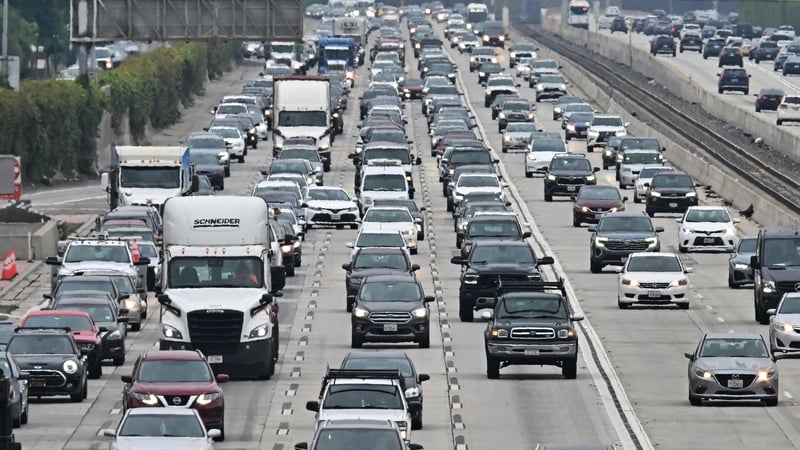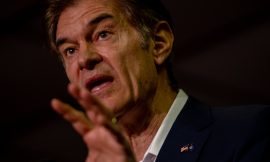US President Donald Trump has said that larger tariffs could be placed on the European Union and Canada if they both work together “to do economic harm to the USA.”
“If the European Union works with Canada in order to do economic harm to the USA, large scale Tariffs, far larger than currently planned, will be placed on them both in order to protect the best friend that each of those two countries has ever had,” he said in a post on Truth Social.
Mr Trump last night unveiled a 25% tariff on imported vehicles, expanding a global trade war and prompting criticism and threats of retaliation from affected US allies.
The new levies on cars and light trucks will take effect on 3 April, the day after Mr Trump plans to announce reciprocal tariffs aimed at the countries responsible for the bulk of the US trade deficit.
They come on top of duties already introduced on steel and aluminum, and on goods from Mexico, Canada and China.
The tariffs would “hurt” carmakers globally, the industry body representing European automakers has warned, calling for “dialogue” to avert a trade war.
“We urge President (Donald) Trump to consider the negative impact of tariffs not only on global automakers but on US domestic manufacturing as well,” said Sigrid de Vries, director general of the European Automobile Manufacturers’ Association.
The US imported $474 billion worth of automotive products in 2024, including passenger cars worth $220 billion. Mexico, Japan, South Korea, Canada and Germany, all close US allies, were the biggest suppliers.
European Commission President Ursula von der Leyen described the move as “bad for businesses, worse for consumers,” while Canadian Prime Minister Mark Carney labelled the tariffs a “direct attack” on Canadian workers and said retaliatory measures were being considered.

“We will defend our workers, we will defend our companies, we will defend our country, and we will defend it together,” Mr Carney told reporters in Ottawa.
Car makers such as Toyota Motor and Mazda Motor led declines in stocks in Japan, which relies on autos for more than a quarter of its exports to the US.
Shares of car makers in South Korea, Hyundai Motor and Kia, fell sharply, while India automakers and parts suppliers also slid.
Japanese Prime Minister Shigeru Ishiba said Tokyo will put “all options on the table” in dealing with the new tariffs and South Korea said it would put in place an emergency response for its hard-hit auto industry by April.
Brazil’s President Luiz Inacio Lula da Silva said Mr Trump risked damaging the US economy with additional tariffs.
“Protectionism doesn’t help any country in the world,” he said at a press conference in Tokyo, vowing to lodge a complaint with the World Trade Organization over a trade levy on Brazilian steel.
Mr Trump sees tariffs as a tool to raise revenue to offset his promised tax cuts and to revive a long-declining US industrial base.
Many trade experts, however, expect prices to initially rise and demand to fall, hurting a global auto industry that is already reeling from uncertainty caused by Mr Trump’s rapid-fire tariff threats and occasional reversals.
“We’re going to charge countries for doing business in our country and taking our jobs, taking our wealth, taking a lot of the things that they’ve been taking over the years,” Mr Trump said at the Oval Office on Wednesday.

“They’ve taken so much out of our country, friend and foe and frankly, friend has been oftentimes much worse than foe.”
Mr Trump’s directive included temporary exemptions for auto parts while government officials sort through the complexities of turning his proclamation into practice.
Since taking office on 20 January, Mr Trump has announced and delayed tariffs on Canada and Mexico for what he alleges is their role in allowing the opioid fentanyl into the US; set import taxes on goods from China for the same reason; launched hefty duties on imports of steel and aluminum; and has repeatedly touted his plans to announce global reciprocal tariffs on 2 April.
Mr Trump said yesterday that auto tariffs could be net neutral for Tesla, the electric car company that is led by Elon Musk, who is also spearheading a government cost-cutting effort.
Mr Musk later posted on X that Tesla would not be unscathed.
“The tariff impact on Tesla is still significant,” he wrote.
TikTok deal
Mr Trump said he would be willing to reduce tariffs on China to get a deal done with TikTok’s Chinese parent ByteDance to sell the short video app used by 170 million Americans.
ByteDance has an 5 April deadline to find a non-Chinese buyer for TikTok or face a US ban on national security grounds that was supposed to have taken effect in January under a 2024 law.
The law is the result of concern in Washington that TikTok’s ownership by ByteDance makes it beholden to the Chinese government and that Beijing could use the app to conduct influence operations against the United States and collect data on Americans.
Mr Trump said he was willing to extend the April deadline if an agreement over the social media app was not reached.
He acknowledged the role China will play to get any deal done, including giving its approval, saying “maybe I’ll give them a little reduction in tariffs or something to get it done,” Mr Trump told reporters.
His comment suggests the sale of TikTok’s is a priority for his administration and important enough to use tariffs as a bargaining chip with Beijing.
In February and earlier this month, Mr Trump added levies totaling 20% to existing tariffs on all imports from China.
Getting China to agree to any deal to give up control of a business worth tens of billions of dollars has always been the biggest sticking point to getting any agreement finalised. Mr Trump has used tariffs as a bargaining chip in the TikTok negotiations in the past.




